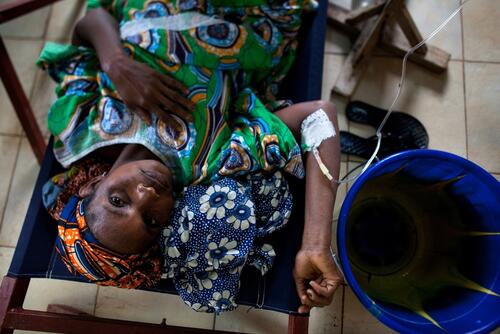Cholera is on the increase on both sides of the border between Sierra Leone and Guinea, in West Africa, aided by the onset of the rainy season. More than 13,000 people have been admitted to hospital in the capital cities of Freetown and Conakry since February, when the disease was declared an epidemic. Médecins Sans Frontières (MSF) is opening additional rehydration points and cholera treatment centres, in collaboration with local authorities, and currently has more than 800 beds available to treat cholera patients.
"I want to die; I'm tired, tired of this disease," whispers a patient in MSF’s cholera treatment centre in the Sierra Leone’s Mabella slum. The hardest hit patients are visibly emaciated after days suffering diarrhoea, vomiting and stomach cramps. Cholera, which spreads through contaminated water, is rife in Mabella, where clean drinking water and toilets are scarce. MSF health promoters are going out into the community to tell people what they can do to avoid catching the disease and to advise them on what treatment is available.
Contaminated water and food
Since the start of the epidemic, MSF’s medical teams have treated nearly 4,600 patients in Sierra Leone and Guinea, which share a reservoir near the coast that is a breeding ground for the disease. “This ‘coastal cholera’ has already killed some 250 people," says MSF epidemiologist Michel Van Herp. "The water reservoir allows the Vibrio cholerae bacteria to survive and go on to infect the population."
Once people are infected through contaminated water or food, the disease spreads quickly, accelerated by poor hygiene practices, lack of latrines and mismanaged wastewater. The disease can only be halted by improving hygiene conditions.
Maintaining prevention activities
Since the region’s last major epidemic, in 2007, cholera has flared up sporadically in Guinea and Sierra Leone. Despite this, many people have gradually lost their immunity to the disease. This year, people in the region are particularly vulnerable. "The current number of cases in Conakry is almost double that of the same period in 2007," says Charles Gaudry, country representative for MSF in Guinea. "The resurgence of the epidemic shows clearly that it is essential to maintain prevention activities both during and between the outbreaks."
While eliminating cholera altogether may still be impossible in many African countries, targeted vaccinations play a role in the fight against the disease. "The oral vaccine used recently by MSF on the coast of Guinea has, until now, prevented an outbreak of cases in this region,” says Gaudry. However, he warns that “vaccination is not a panacea; in-depth work on water and sanitation networks is the only way of controlling the disease in the long term.”
In Africa, there were 85,000 cholera cases and 2,500 deaths from cholera recorded in 2011, according to the World Health Organization. MSF has extensive experience dealing with the disease, treating more than 130,000 cholera patients worldwide in 2011. Between late April and mid-May 2012, MSF vaccinated 143,000 people along the coast of Guinea in collaboration with the Guinean Ministry of Health.



